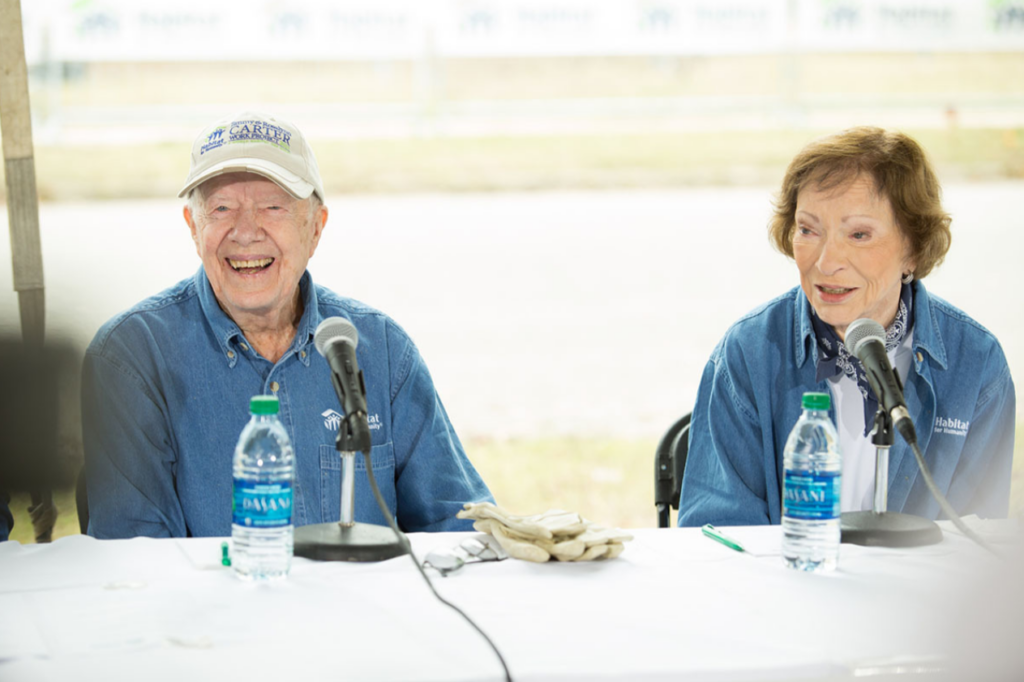
I keep in my office a handwritten note from Jimmy Carter, explaining why he would not be able to come to the celebration of the fifth anniversary of the opening of Church Health in 1992. With all my chutzpah, I had invited him and genuinely believed that he might accept.
What former president of the United States would take the time to hand write a note explaining why he could not come to Memphis? And why did I think he might accept?
After Carter lost the presidency in 1980 to Ronald Reagan, he and his wife Rosalynn started the Carter Center in Atlanta in 1982.
From the beginning, the Carter Center had five objectives:
- Advancing peace and conflict resolution throughout the world;
- Promoting human rights and democracy;
- Fighting poverty and advancing sustainable development;
- The worldwide eradication of Guinea Worm disease, also known as River Blindness;
- The promotion of matters of faith and health.
That last objective seemed very minor for the former members of the State Department and other members of Carter’s entourage who were with him during his presidency. They struggled to get their hands around what this even meant.
In 1989, only two years after Church Health had opened, I was invited to speak at The Carter Center during a national conference it was sponsoring on the subject of faith and health.
I was only 35 years old at the time. In Carter’s opening remarks he discussed how he had personally gone through the New Testament and came to realize that one-third of the Gospels have to do with healing the sick.
As a born-again Christian, by his own reading of the Bible, he concluded that one cannot be a faithful Christian and true follower of Jesus if you don’t take seriously your own involvement in a healing ministry.

Carter believed that every church and every community of faith should be directly involved in a healing ministry. If that is not the case, you will be ignoring a third of the Gospel.
And he believed that no one wants to look God in the face at the end of time and explain why you had not taken any of that seriously.
Carter, with the urging of Rosalynn, also focused on matters of mental health. The Carter Center launched the Mental Health Program to reduce the stigma, improve public policy, and ensure access to care.
They collaborated with faith leaders to address mental health in communities and emphasized the spiritual nature of mental health issues.
The Carter Center framed healthcare as a moral imperative invoking not just Christian, but all faith traditions to support the idea of health as a human right.
Since that theological message is what I had committed my life’s work to, I connected to Carter for the rest of his life, and it’s why I had real hope he might come to Memphis a few years later.
After a while, the State Department aficionado’s won out in terms of the focus of the Carter Center. World peace and human rights became Carter’s primary emphasis for years to come.
He also became the spokesperson for Habitat for Humanity after a chance encounter with its founder Millard Fuller and his wife Linda.
While living in Plains, Georgia, Carter learned of the work of Habitat, which was based in Americus, Georgia. After becoming friends, Fuller proposed the Jimmy and Rosalynn Carter Work Project.
Starting in 1984, the Carter’s, working alongside volunteers, would build a house for Habitat every year to bring national attention to the cause.
As for matters of health, the Carter Center moved front and center to spearhead the worldwide effort to eradicate the disease caused by Guinea Worm, more commonly known as River Blindness.
River Blindness is caused by a parasite that is transmitted by black flies that are endemic in sub-Saharan Africa and parts of Latin America.
A medicine called ivermectin kills the larvae of the parasite. In 1987, the pharmaceutical company Merck and Co. began donating ivermectin to the world.
The distribution of the drug has been led by the Carter Center and its allies to the point that the disease only exists in the most rural regions of the world. Millions of people have been spared the sorrow this disease causes.
In the coming days, much will be said about Carter as a one-term president. His failures with the Iran hostages. The challenges of the oil embargo. His landslide loss to Ronald Reagan.
He will be described as the most successful former president our country has ever had. They will reference the 33 books he wrote, the houses he built, and the Nobel Peace Prize he won.
For me, I will remember his passion for taking his faith seriously. Health care for the poor is not just something the government should care about, it is something every believing person should make their own.
As a president, I suspect Carter will ultimately be judged as a victim of times that could not be controlled, and a man who tried to invoke morality into situations where the morally right decision faced impossible headwinds.
Personally, I will remember him as a person of faith who cared deeply about matters of justice and equality.
He may have never physically made it to visit Church Health, but the principles he stood for permeate all that we do.
Read the full story on Daily Memphian.
The Rev. Dr. G. Scott Morris, M.D., is founder of Church Health. He is a regular contributor to The Daily Memphian.
The Daily Memphian is the must-read, primary daily online publication for intelligent, in-depth journalism in the Memphis community. The Daily Memphian reports on critical news, holds political, business and community leaders accountable, and engages with and entertains its readers – all while seeking truth, acting with integrity, and never fearing stories simply because of their negative or positive attributes. Led by a seasoned team of veteran journalists, The Daily Memphian is of Memphis, not just in Memphis, and seeks to tell the stories of this city.
